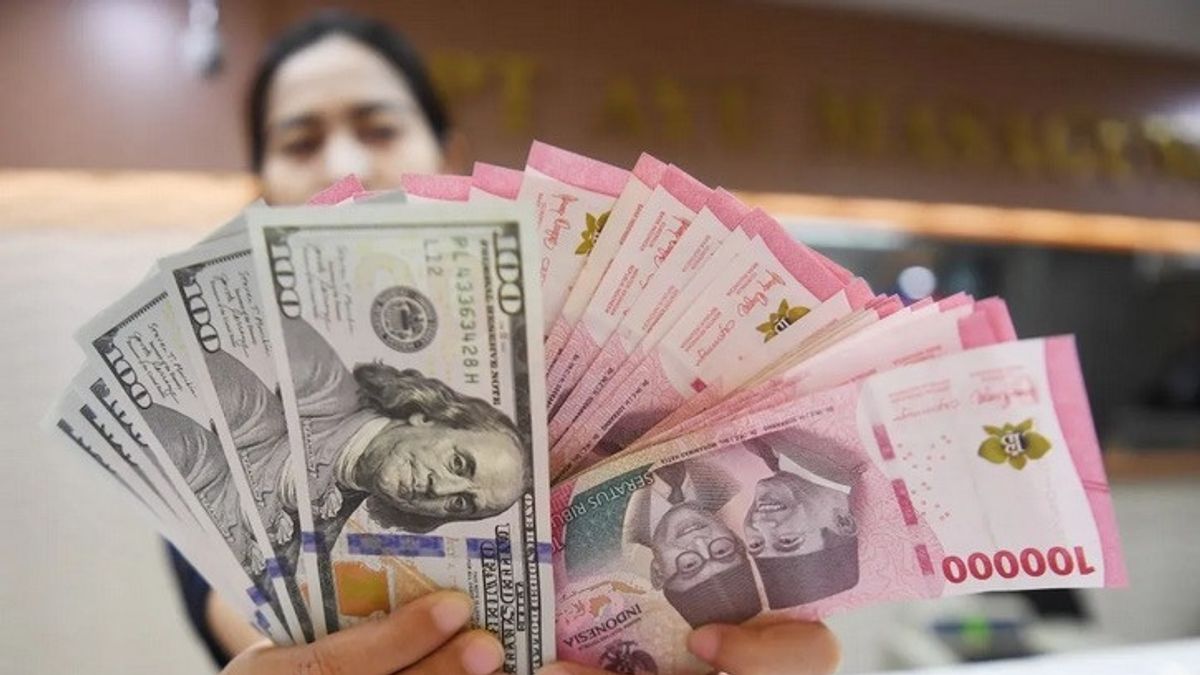JAKARTA The rupiah exchange rate against the United States (US) dollar continued to weaken throughout June. The US dollar even shot up to penetrate 16,421 on Thursday (20/6/2024) afternoon.
The weakening of the rupiah exchange rate against the US dollar continues to increase to the attention of many parties, including in the context of the micro economy and its impact on Indonesian households.
Because the weakening of the exchange rate does not only affect the economic condition of a country, but also affects people's daily lives.
This was stated by the Director of the Center of Economic and Law Studies (CELIOS) Bhima Yudhistira. According to Bhima, the household sector is among the most affected by the weakening of the rupiah exchange rate against the dollar.
"The price of goods, especially imported goods, such as electronics, automotive goods, motor vehicle spare parts, household appliances will increase," said Bhima when contacted by VOI.
"There are concerns that price increases at the retail level and for the public, they have to pay more expensive because there is a difference in the exchange rate, which is continued by importers to final consumers," he added.
The weakening of the rupiah exchange rate against the US dollar, which has occurred since early June, has attracted the attention of the public, including housewives and medium, small and micro enterprises (MSMEs) in the country.
This is because the weakening of the rupiah exchange rate is almost certainly accompanied by an increase in the prices of basic commodities which can make mothers scream.
BELIOS Director Bhima Yudhistira explained several impacts felt by households when the US dollar continued to strengthen against the rupiah.
First, the weakening of the rupiah exchange rate will make the price of fuel, LPG, and electricity rates, especially those that are non-subsidized, will experience adjustment or increase. This is because the rupiah exchange rate is a key variable for the stability of energy prices.
SEE ALSO:
In addition, weakening the rupiah exchange rate also makes job opportunities very limited or people's income slows down and can even decrease. In the aftermath, this has the potential to increase the unemployment rate.
Finally, the impact of weakening the rupiah exchange rate on the US dollar will be felt on increasing interest rates.
If the rupiah weakens, monetary intervention is usually carried out by raising the benchmark interest rate and the reference interest rate which increases, meaning that it directly affects the bank interest rate, both business capital credit, as well as consumption credit such as mortgages, motor vehicle loans that are increasingly expensive, Bhima explained.
In addition to rising electronic prices, the weakening of the rupiah also has an impact on food prices. This was mentioned by the Head of the Center of Digital Economy and the SMEs Institute for Development of Economics and Finance (INDEF) Eisha Maghfiruha some time ago.
He said the drop in the rupiah could have an impact on increasing spending on Indonesian housewives due to the increase in the price of imported staples. Rice, tempeh and soybeans are examples of basic commodities obtained through imports. Indonesia itself is listed as an importer of soybeans.
In the last five years, the volume of soybean imports has actually continued to shrink, around 12.04 percent from 2.59 million tons in 2018 to 2.27 million tons in 2023. The highest soybean imports occurred in 2019, which was 2.67 million tons.
Although the volume is sloping, the data shows that the value of soybean imports continues to rise. In five years the value of imports soared more than 30 percent from IDR 1.47 billion.
Rice, tempeh, soybean are also imports. For mothers, it is certain that if prices in the market go up, they will scream," Eisha said in a virtual INDEF Women's Economist Public Discussion last April.
In order to keep purchasing power from experiencing a decline, Eisha said the government needed to control prices and maintain inflation. This effort requires cooperation between the government and Bank Indonesia.
"From the purchasing power of public consumption, what is prioritized is that they are the lower class and vulnerable. It is necessary to see the impact of price increases on people's purchasing power," he explained.
The English, Chinese, Japanese, Arabic, and French versions are automatically generated by the AI. So there may still be inaccuracies in translating, please always see Indonesian as our main language. (system supported by DigitalSiber.id)















